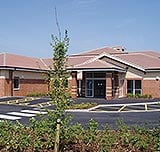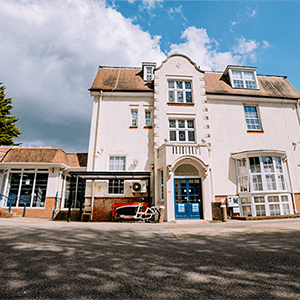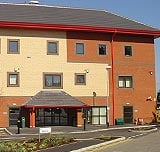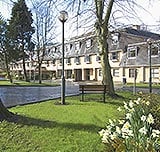
Plantar fasciitis happens when the foot tissue used for walking and moving your foot, called the plantar fascia, becomes inflamed. It typically causes a stabbing pain in the bottom of your foot near your heel which is often worst when you wake and take your first few steps.
The cause of plantar fasciitis can be anything that irritates or damages your plantar fascia. This includes your shoe type, overuse, lack of warm-up and stretching, and the sort of surface you move on. Also, your foot structure can cause plantar fasciitis.
Plantar fasciitis treatment usually involves conservative treatments, such as icing the painful area, stretching, adapting or pausing activities, and over-the-counter medicine. Most people with plantar fasciitis recover within several months without the need for surgery.
Plantar fasciitis is a common cause of heel pain. It happens when your plantar fascia, a strong band of tissue that runs along the bottom of your foot, becomes inflamed. This tissue connects your heel bone to the base of your toes and supports the arch of your foot. It absorbs shock and plays an important role in how your foot moves when you walk.
When you stand or put weight on your foot, the plantar fascia stretches and tightens. This tension increases more when you push off on the ball of your foot or toes, such as when walking or running. Over time, or with too much use, the plantar fascia can become irritated and inflamed, leading to pain even during everyday activities.
Plantar fasciitis typically causes pain in the bottom of your foot near the heel. This plantar fasciitis heel pain often starts gradually but can sometimes come on suddenly if for example you miss a step or jump from a height. It is usually worst in the morning when you take your first steps after waking up, often being referred to as "first-step pain".
Your plantar fasciitis pain may improve a little as you move around during the day or after warming up, but it can return and feel worse after standing for long periods or doing vigorous activities. The pain is often sharper when walking barefoot or wearing shoes with little support.
Stress to your plantar fascia can cause small tears and repeated tears may lead to irritation, inflammation, and heel pain. The exact cause of plantar fasciitis is often unclear.
Medical conditions like lupus or rheumatoid arthritis.
Factors that can increase your risk of developing this condition include:
A plantar fasciitis diagnosis is usually made based on your medical history, pain location, and a physical exam to check tender areas in your foot.
Diagnositc tests such as an X-ray or MRI are not usually needed. They may be used to rule out other problems such as a stress fracture. An X-ray may show a piece of bone sticking out from your heel bone, called a bone spur, but it is rare that these are problematic and need surgically removing.
Plantar fasciitis treatments at home aim to reduce your plantar fasciitis pain and inflammation. They include:
Steroid injections temporarily reduce inflammation and pain. They are often used if symptoms persist after more conservative treatments. However multiple injections are not recommended due to the risk of weakening the plantar fascia.
Most people recover with conservative at-home treatments, but severe cases or high-demand athletes may require longer treatment courses or additional interventions.
Surgery tends to be the last resort for plantar fasciitis treatment, for severe, persistent cases. Options include:
At Ramsay Health Care, we offer fast and convenient appointments with our expert consultants who will listen to your symptoms of plantar fasciitis and recommend treatments.
We have a multi-disciplinary team including physiotherapists, podiatrists, consultant orthotists, consultant orthopaedic surgeons, consultant neurosurgeons and consultant rheumatologists who understand the pain of plantar fasciitis and provide the best treatment options.
Contact us today to speak to our friendly team for more information, or to book an appointment.























We are delighted to announce the appointment of Miss Sabeen Akhtar as the new Group Medical Director at Ramsay Health Care UK.
Springfield, part of Ramsay Health Care UK, is delighted to announce that men suffering from a benign enlarged prostate (Benign Prostatic Hyperplasia) will be able to receive robotic Aquablation Therapy.
Ramsay Health Care UK joined Leeds Pride to celebrate love, unity, and inclusion. Our growing culture of allyship ensures colleagues and patients feel seen, valued, and celebrated.
The information, including but not limited to, text, graphics, images and other material, contained on this website is for educational purposes only and not intended to be a substitute for medical advice, diagnosis or treatment. Always seek the advice of your physician or other qualified health care provider with any questions you may have regarding a medical condition or treatment.
No warranty or guarantee is made that the information contained on this website is complete or accurate in every respect. The testimonials, statements, and opinions presented on our website are applicable to the individuals depicted. Results will vary and may not be representative of the experience of others. Prior patient results are only provided as examples of what may be achievable. Individual results will vary and no guarantee is stated or implied by any photo use or any statement on this website.
Ramsay is a trusted provider of plastic or reconstructive surgery treatments as a part of our wrap-around holistic patient care. Our personal, friendly and professional team are here to support you throughout to ensure the best possible care. All procedures we perform are clinically justified.
*Acceptance is subject to status. Terms and conditions apply. Ramsay Health Care UK Operations Limited is authorised and regulated by the Financial Conduct authority under FRN 702886. Ramsay Healthcare UK Operations is acting as a credit broker to Chrysalis Finance Limited.
Ramsay Health Care UK is not currently recruiting for any roles based outside of England. If you are interested in applying for a role with Ramsay Health Care UK, please note that all available positions are advertised exclusively on our official website: https://www.ramsayhealth.co.uk/careers. Be cautious of individuals or organisations that approach you directly for remotely-based roles. Always verify the authenticity of the job offer and be careful with whom you share your personal information. For more information and advice on employment fraud, please visit: https://www.ramsayhealth.co.uk/careers/recruitment-fraud